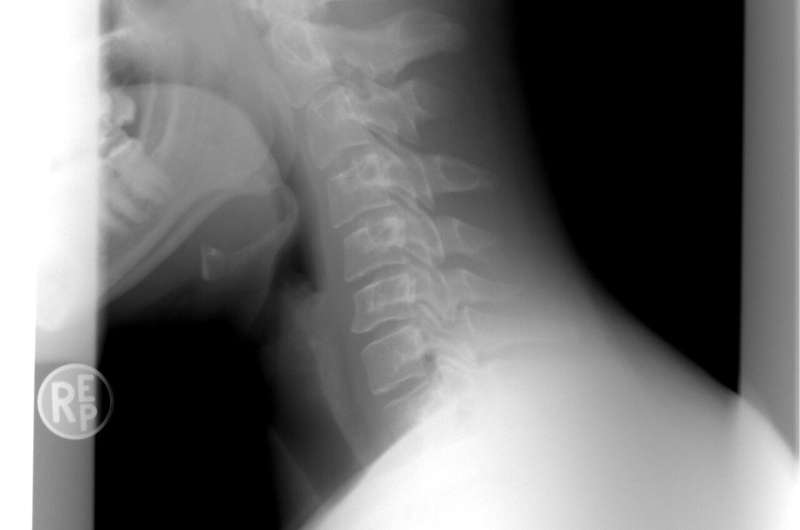This article has been reviewed according to Science X's editorial process and policies. Editors have highlighted the following attributes while ensuring the content's credibility:
fact-checked
peer-reviewed publication
trusted source
proofread
Why improving bone health before complex spine surgery is important

For people with bone problems such as osteopenia or osteoporosis, improving bone health before complex spine surgery is important. Improving bone density before spinal fusion or surgery to repair a deformity lowers the rate of complications, according to Mayo Clinic studies published in Spine and the Journal of Neurosurgery.
Osteopenia is when bones become less dense. Osteoporosis is when bones become even more brittle and can break easily. Both problems increase the risk of broken bones and are common among spinal surgery patients ages 50 and older and among people under 50 at risk of bone health problems because of other factors, such as chronic steroid use or early menopause.
"One of the biggest challenges in adult spinal surgery—in addition to achieving proper alignment—is ensuring correct healing," says Dr. Benjamin Elder, a Mayo Clinic neurosurgeon. "Our goal is to get patients' bones as healthy as possible before they go into surgery."
Neurosurgeons and endocrinologists, who specialize in bone metabolism, work together to help patients determine the cause of their poor bone health—whether it's because of aging, smoking, steroid use, vitamin D deficiency or some other cause. One possible cause is hyperparathyroidism, when the body creates high amounts of parathyroid hormone in the bloodstream. The parathyroid hormone, which helps maintain calcium balance, is important for bone health.
Treatment may help maximize bone health
To improve bone mineral density, treatment may include medications. Other strategies to improve spine healing may include:
- Smoking cessation
- Weight loss
- Diabetes control
Treatment may range from two months to two years before complex spinal surgery. Continued maintenance therapy after surgery is essential.
"If the surgery is done on weak bone and fails, additional repair might be impossible," Dr. Elder says. "These are 12-hour surgeries that require a week in the hospital and a year for complete recovery. They have a high complication rate. That's why we try to do everything possible to maximize results."
Five tips to improve your bone health
Beyond giving shape to a body's skeleton, bones are busy. Healthy bones help you move. They anchor muscles and protect your brain, heart and other organs from injury. Bones store minerals that get released into the body for multiple uses.Dr. Elder stresses that everyone should take care of their bone health by following these tips:
- Include calcium in your diet. Calcium builds strong bones. Good sources of calcium are dairy products, almonds, broccoli, kale, canned salmon with bones, sardines and soy products, such as tofu.
- Pay attention to vitamin D. Your body needs vitamin D to absorb calcium. Good sources of vitamin D include oily fish, such as salmon, trout, whitefish and tuna. Additionally, mushrooms, eggs and fortified foods, such as milk and cereals, are good sources of vitamin D. Sunlight also contributes to the body's production of vitamin D.
- Talk to your health care team. If you wonder if you are getting enough calcium or vitamin D, ask your health care team about the correct amounts for you and whether to consider supplements.
- Follow a regular exercise routine. Weight-bearing exercise builds bones. Walking, jogging and climbing stairs can help you slow bone loss.
- Avoid substance abuse. Don't smoke. For women, avoid drinking more than one alcoholic drink a day. For men, avoid drinking more than two alcoholic drinks per day.
Research: Regenerative medicine approach
Dr. Elder also is studying the use of stem cells and biomaterials to repair spinal bone and cartilage, with the ultimate goal of avoiding major fusion surgeries. Another project is developing an injectable polymer that promotes bone growth. The polymer could be used to perform minimally invasive spinal fusions or as a bone cement that could regrow the bone.
More information: Zachariah W. Pinter et al, Lower Hounsfield Units and Severe Multifidus Sarcopenia Are Independent Predictors of Increased Risk for Proximal Junctional Kyphosis and Failure Following Thoracolumbar Fusion, Spine (2023). DOI: 10.1097/BRS.0000000000004517
Anthony L. Mikula et al, Association between lower Hounsfield units and proximal junctional kyphosis and failure at the upper thoracic spine, Journal of Neurosurgery: Spine (2022). DOI: 10.3171/2022.3.SPINE22197




















